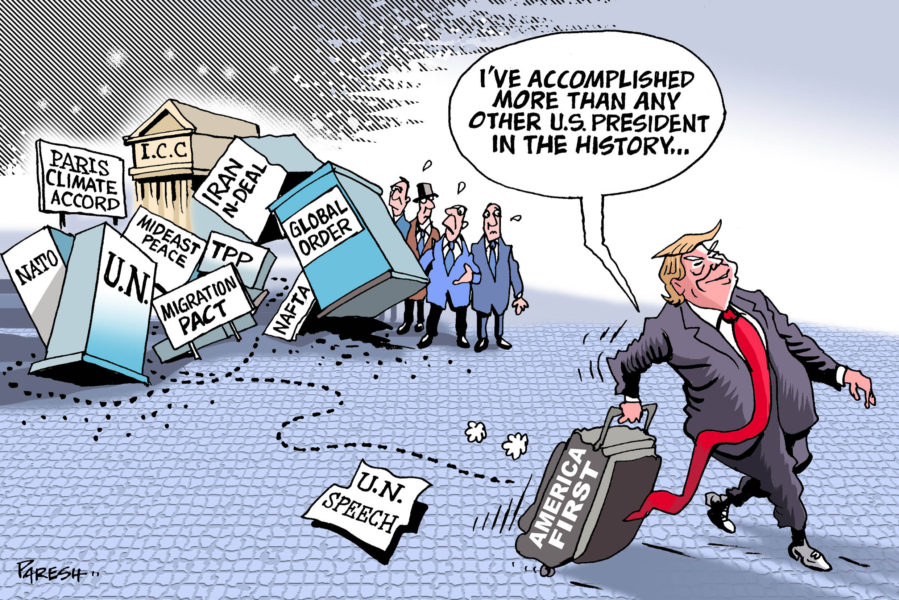
Tired and Solitary Display in South China Sea by the US
The U.S. has been deliberating on these sanctions for a long time. By pushing them out now, little over two months away from the presidential election, it is clear that they are being used to display a tough approach on China and fuel voter support for President Donald Trump; they can be viewed as a coordinated diplomatic action to help the presiding Republican government achieve reelection.
The magnitude of these sanctions was planned according to the needs of the election. The actual threat they pose to Chinese companies added to the list, such as the China Communications Construction Company, is limited, but they create some uncertainty for these companies' future development abroad. With the announcement of these sanctions, the U.S. has further reinforced its recently expressed position on the issue of South China Sea sovereignty, and intensified its antagonism toward China within the South China Sea. However, it has not made any signs of escalating its strategic goals in the South China Sea or preparing for a contest of strength with the Chinese army. Its bearing in the South China Sea is merely the result of habitual, gradual change.
The issue of sovereignty over the South China Sea has been analyzed and worked over many times already. The region has gradually developed an adaptability toward disputes of public opinion and legal principle. With talks for a code of conduct for the South China Sea underway, the risks associated with these disputes is shrinking, and the space for external forces like the U.S. to stir up trouble is limited.
The true risk to the state of affairs in the region is the possibility of military friction. The probability of mishaps occurring between China and other claimant countries on the South China Sea is less than in previous years; however, the risk of an incident sparking serious conflict between the American and Chinese naval and air forces is growing. This is the real central cause for elevated tension in the region.
On the one hand, the U.S. brutally pushes freedom of navigation in the South China Sea, putting constant pressure on China, while on the other, it fears the continuous modernization of China's naval forces and land-based missile force, as well as China's determination to hold fast to the bottom line of its interests. Our resolve to firmly retaliate in the face of an attack is unwavering, no matter when it may come. The U.S. understands this, and so its provocations in the South China Sea will oscillate within the existing region, and it will remain cautious about challenging China's bottom line.
Foreign media reported that China’s People's Liberation Army fired DF-21D and DF-26B missiles into South China Sea waters on Aug. 26. China has not yet confirmed nor denied these reports. We believe that as the U.S. military flexes its muscles in the South China Sea with increasing frequency, the People's Liberation Army must simultaneously increase activity within those waters. We must stifle and hedge against the United States' arrogance, reinforce its understanding that China is unafraid of war and that it will not be softhearted if conflict erupts, and prevent Washington from mistakenly believing that it can scare the Chinese people by flaunting its military power.
Sanctions against Chinese companies are a fairly peripheral move in this game between the U.S. and China. They won't be able to create any substantial pressure against China, and their ability to boost morale for countries like Vietnam and the Philippines is also extremely limited. Chinese people will also turn their noses up at visa restrictions against Chinese personnel especially. Right now, the U.S. is far from bringing the coronavirus pandemic under control; how many Chinese will be willing to cross the Pacific to visit the country with the world's severest outbreak?
The U.S. is constantly placing Chinese companies on its entity list. While it is not easy for China to take equivalent retaliatory action, we don't need to become disheartened. That's because, firstly, all commercial sanctions are necessarily a double-edged sword; when the U.S. sanctions a Chinese company, it is simultaneously cutting away at American companies too. Secondly, as the U.S. uses sanctions more and more, protections against these American sanctions will gradually become a part of Chinese companies' genome, and the strategic ability to hedge against these sanctions will take shape within the Chinese economy. This kind of adaptability will certainly develop at an accelerated pace.

